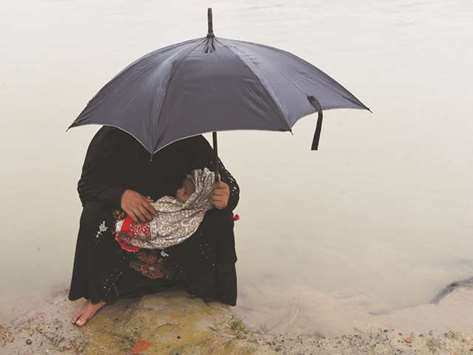Rohingya refugees in Bangladesh said yesterday they were dismayed by a speech by Myanmar leader Aung San Suu Kyi in which she condemned rights violations against them but, as far as they could see, offered little hope of them ever going home.
Suu Kyi, the 1991 Nobel Peace Prize winner, on Tuesday made her first address to her nation on violence in the western state of Rakhine that began last month and has forced 422,000 Rohingya Muslims into Bangladesh, fleeing a military offensive the United Nations has branded ethnic cleansing.
“I’m very disappointed. She will not get another prize from the international community,” said Shafi Rahman, 45, who said he had arrived in Bangladesh two weeks ago after soldiers and civilian mobs burned his village. “I have no hope to go back. My documents were stripped from my forefathers decades ago.”
Rights monitors and fleeing Rohingya say the army and Rakhine Buddhist vigilantes responded with a campaign of violence and arson aimed at driving out the mostly Muslim population.
The UN rights agency said it was “a textbook example of ethnic cleansing.”
Smoke could be seen rising from at least two places in Myanmar yesterday, a Reuters reporter in Bangladesh said. It was not known what was burning but rights groups say almost half of Rohingya villages in the region have been torched.
In her Tuesday speech, Suu Kyi condemned abuses and said all violators would be punished, adding that she was committed to the restoration of peace and the rule of law.
She did not address UN accusations of ethnic cleansing by the security forces, drawing a cool international response.
On the return of refugees, she said Myanmar was ready to start a verification process under a 1993 arrangement with Bangladesh and “those who have been verified as refugees from this country will be accepted without any problem.”
But refugees in Bangladesh who were aware of her comments took no comfort from that, anticipating little change to policies that have denied their community recognition as a distinct ethnic group and citizenship.
Most people in Buddhist-majority Myanmar see the Rohingya as illegal immigrants from Bangladesh and refuse to even recognise the term Rohingya.
“She didn’t mention Rohingya. Rohingya is our ethnicity,” said Nizam Uddin, 19, who arrived in Bangladesh in November, following violence the previous month. “Most of our documents were burned by the military ... We don’t have proof of citizenship and how can we get it? “I have no hope.”
A Rohingya refugee woman waits for aid with her child at the Sha Porir DWIP in Teknaf yesterday.

GULF TIMES
